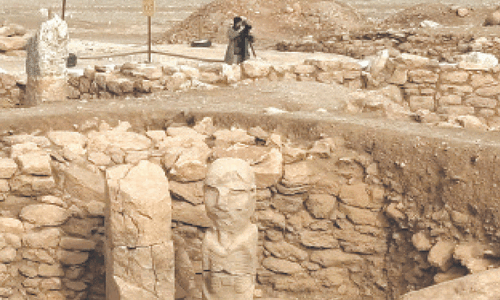BAGHDAD: Billed by Iran as a warning to Israel, Sunday’s attack on an Iraqi city was a pointed reminder of Tehran’s armed clout for its US and Arab foes at a delicate moment for the country, according to Iraqi and Western officials say.
The unusual direct strike coincides with a potential turning point in the Middle East balance of power, as talks to revive an Iranian nuclear deal face possible collapse and heightened risks of war in the Gulf, while in Baghdad, Iraqi leaders are trying to form a new government shorn of Iranian influence.
Both developments, some regional analysts say, help explain why Iran chose this moment to exhibit its readiness to use ballistic missiles, long prized by Tehran as a deterrent against the United States, Israel and Arab states that contest Tehran’s regional sway.
The decision by Iran’s Revolutionary Guards Corps (IRGC) to fire the projectiles directly into territory controlled by the US-friendly Kurdish regional government _ and to declare the attack _ is a departure from Iran’s normal procedure of applying military pressure through proxy militias.
The missiles hit near a building which the US consular team in Erbil, Kurdistan’s autonomous regional capital, is due to move to. It caused no US casualties and hurt one civilian.
The IRGC said the attack was aimed at Israeli “strategic centres” and was retaliation for an Israeli air raid that killed two of its members in Syria last week.
The Israeli killing of IRGC members in Syria was likely the trigger for the Erbil attack, but the assault was also a warning to the United States and its Arab partners, as well as Iraqi leaders who are threatening to form a government that excludes Tehran’s chief allies in Baghdad, officials and experts said.
“You’ve got three things going on here,” said Professor Toby Dodge of the London School of Economics.
“There’s the JCPOA (Iran nuclear deal), tit-for-tat fighting between Iranians, Israelis and the US, and now Iraqi government formation. So you’re sending a series of messages.”
An Iran-aligned Iraqi militia commander insisted Israel was the prime target, but acknowledged that the message being sent could be broader _ and a clear sign that Iran was willing to escalate if it felt threatened.
“It’s a message to Israel and to all countries that any attack, they will respond to with missiles,” and not just via proxies, said the commander.
Israel has ramped up its attacks against the IRGC and its proxies in the region with at least 15 air raids in Iran’s regional ally Syria in the past year, nine of which were carried out in the last four months.
Iran-backed Iraqi militia groups have regularly attacked US targets in recent years, including its force of some 2,000 troops deployed across Iraq and Syria to fight remnants of the militant Islamic State group, with increasingly sophisticated attacks.
Published in Dawn, March 15th, 2022
































